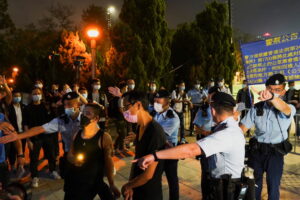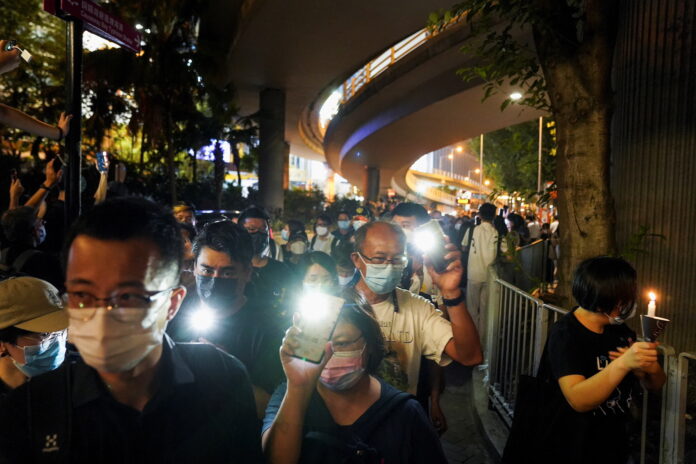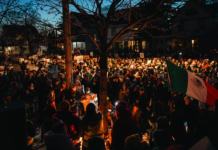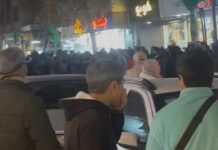Campaign launch discussed solidarity with workers, feminists and democracy activists
The following article is based on a speech by Vincent Kolo of chinaworker.info at a launch meeting for the SARCHK campaign on 9 June, 2021, in England, Wales and Scotland. Other launch meetings have been held in Belgium, Germany, Sweden and the United States.
Hong Kong is now a de facto police state. China’s so-called Communist dictatorship (CCP), which is actually a completely capitalist and reactionary regime and has nothing whatsoever to do with communism, has taken full control over Hong Kong in the past twelve months. Previously there was a form of devolved local rule with a degree of political autonomy, but progressively the CCP dictatorship has taken full control over government, the courts, the schools, the media, the civil service and even the economy of Hong Kong.
The traditional Hong Kong capitalist tycoons who’ve been a key ally of the CCP for the last 30 years, since the CCP carried through the return to capitalism in the 1980s and 90s, these traditional Hong Kong tycoons are now increasingly being squeezed out economically by mainland China capitalist groups. Therefore, what we have alongside the political repression is an aggressive economic colonization of Hong Kong and this is one of the features of Chinese imperialism, which is something that is crucial to understanding what is happening in China, Hong Kong, and how that fits in with the imperialist Cold War that is raging internationally.
Solidarity Against Repression in China and Hong Kong is a unique campaign for supporting workers’ struggles in China and in Hong Kong, supporting the struggle for democratic rights, and supporting the activity of Marxists and socialists who are facing persecution, arrest and imprisonment in both China and Hong Kong. This campaign is to raise political awareness, to educate within the labour movement, to prepare workers that to effectively resist the US-China Cold War, which is escalating, we have to have an understanding of what is really happening in China.
It’s much more straightforward to follow what’s happening in the US. For all the faults of the capitalist media, nevertheless there’s a certain diversity, whereas in China there’s a complete lockdown on information being spread apart from the information that comes from the underground and from political activists who risk harsh repression.
In Hong Kong since the national security law was imposed by China one year ago around 100 political activists have been charged with offenses under this law. The maximum penalty under this law is life imprisonment. Actually, that’s not the maximum – there is a clause that allows in particularly serious cases for defendants to stand trial in China, and in China they could face the death penalty. That’s not been invoked up to now but the threat is there.
In addition to the 100 who are facing the most serious charges, there are over 10,000 mostly young people who have been arrested for political offenses in connection with the mass protest movement of 2019. These cases are being brought to court all the time. Every few days there is a new trial. Over seven hundred so far have been convicted from this wider group of 10,000 for alleged offenses committed in 2019 in the course of the mass democracy struggle, which saw up to two million people take to the streets. Many in this group of 700 have been sentenced to five years or more in prison.
Trial by jury abolished
Under the national security law there is no longer trial by jury, something that has existed for 176 years in Hong Kong due to its British judicial system. This is now abolished for national security law offenses such as subversion or collusion with foreign forces. There is no bail, or very little chance of bail. Previously in Hong Kong you would have to be accused of murder or a very serious crime to be refused bail. Now defendants in political trials are routinely refused bail.
For example, ‘Long Hair’ Leung Kwok-hung, who was the only left-wing elected member of the previous legislature – he was elected five times to the Legco (Legislative Council) – he’s been in prison since the end of February because he’s been refused bail. He’s on trial with forty-six other defendants in what is the most important of the political trials going on in Hong Kong at the moment. Most of the 47 were refused bail and they’ve been behind bars for three months.
The second hearing of their case was last week (on May 31), and the most significant development is that the prosecution, i.e., the CCP and its Hong Kong government, proposed that the case be transferred to the High Court. What does this mean? There is one reason and one reason only: life sentences. In the lower court they don’t have the power to sentence someone to lifetime imprisonment. It’s therefore very likely that many if not all of the 47 will receive the maximum sentence.
“Patriots ruling Hong Kong”
This is an absolutely grotesque so-called judicial process. It’s a show trial worthy of Stalin’s regime in the 1930s. The alleged crime is that the 47 participated in an electoral ‘primary’ a year ago to decide which pro-democracy candidates should go forward to contest the legislative election. That election was subsequently cancelled, and now that legislature no longer exists. It has been killed off by the regime and replaced by a zombie legislature.
The previous Legco was not a paragon of democracy. Only 50 percent of the seats were chosen by the electorate. The other 50 percent were effectively appointed by different government bodies and capitalist interest groups. Now, under an “improved system” imposed by the Chinese dictatorship, only one in five of the seats will be elected by the voters as a whole, while four-fifths of the seats will be appointed by the CCP, by its puppet bodies in Hong Kong and by different capitalist interest groups. Furthermore, all the candidates to the new legislature will be vetted by the equivalent of MI5 (the secret police). Imagine if that was proposed in the UK, that candidates for elections to Westminster first had to be approved by MI5.
This system is described by the CCP and its apologists as ensuring that “patriots rule Hong Kong”. They don’t want ‘unpatriotic’ elements such as the pro-democracy parties, such as ‘Long Hair’, being elected. In this case, the word ‘patriot’ means slavish followers of Xi Jinping’s dictatorship who never criticise its repression.
Growth of left ideas
Of course, the repression is even worse in mainland China. Workers’ strikes are routinely smashed by the police. Those who organise or lead strikes are arrested and imprisoned. Left-wing youth who support workers’ protests are arrested and imprisoned. Some of these youth call themselves Maoists, it’s a very broad term in China. There has been a huge radicalisation of youth in China and growth of interest in left-wing and socialist ideas. It’s a very progressive development.
They identify as Maoists for historical reasons, but actually when you discuss with them, many are not Maoists, not like the Maoists you might come across in some countries in Western Europe or North America. A significant layer of young Maoists in China are in favour of LGBTQ rights. They’re positive towards feminism. They oppose repression and regard the CCP – as we do – as a capitalist regime. So, this is not classical Maoism. Some of these youths have been involved in helping workers to organise strikes; they’ve been rounded up, imprisoned, disappeared.
There are some misguided sections of the left internationally who think the left should give some kind of support to China in the conflict with the US, because the US is the most dangerous enemy, it’s the biggest imperialist power, and surely, they reason, the CCP stands for some kind of radical alternative? Well, it doesn’t. It’s a capitalist government, an imperialist government, and in terms of the rights of the working class and for the left, the CCP is a viciously repressive government.
There is the recent case of the delivery drivers. They’ve organised strikes in at least three cities in the last few months over cuts in pay and unsafe working conditions. There are over seven million food delivery (motorbike) drivers in China. This is the ‘gig economy’: they have no employment contracts, no medical or pension benefits. Fifteen percent of these drivers have a university degree, because graduates in China can’t get other work and so they’re recruited into this army of gig workers. When these workers tried to organise strikes earlier this year their alleged leader Chen Guojiang was arrested, that was on February 25, and as far as we know he’s still in prison.
Solidarity Against Repression in China and Hong Kong is also campaigning for Chen Guojiang’s release and for the right of workers to form independent trade unions and the right to strike in China, rights that don’t exist today. With over 800 million workers, China is the biggest non-union workforce in the world. These are issues that need to be addressed when some people misguidedly argue that the CCP is a “left” or “radical” government.
Anniversary of June 4
June 4 is the anniversary of the Tiananmen Square massacre. That was a very important mass movement in 1989, a turning point. When that movement was defeated, it removed the last obstacle to China going back to capitalism. One thousand or more were killed by the PLA on June 4 – it’s a state secret – we don’t know the real number but it’s certainly over 1,000.
The June 4 massacre has been commemorated every year in Hong Kong, but this year for the second year running the vigil was banned. The last time it was held, in 2019, before the pandemic, there were 180,000 in attendance. This year, the government again used the pandemic as a pretext to ban the vigil, but there was a difference in that they threatened any who tried to participate with five years’ imprisonment, and for publicising the event for example on social media, one year in prison.

The official organiser of the event, the Alliance (full name: Hong Kong Alliance in Support of Patriotic Democratic Movements of China), a coalition comprised of various pan-democratic and liberal parties and NGOs, did not put up much resistance to the ban. They did not even organise an online meeting in protest at the ban. This conforms to a wider trend whereby the official parties and groups of the democracy struggle are in many cases showing no resistance to the repression.
For years we socialists have been critical of the way the Alliance, which is a very top-down body, has organised the June 4 anniversary vigil. Instead of linking the memory of 1989 to today’s struggles against authoritarianism, they have largely de-politicised the anniversary, turning it into a ceremony with songs and poetry.
Spontaneous protests
What happened in Hong Kong on June 4 this year, which has not been widely reported, was quite incredible. Despite this far-reaching ban and threats of severe repression, with 7,000 police on duty to prevent protests, and despite the absence of any leadership, over 30,000 and possibly up to 60,000 mostly young people, turned out in defiance of the ban. They went to the streets around the park where the vigil is normally held and to other districts around the city. This led to impromptu demonstrations.
The police initially began arresting people for having candles. But they did not expect such crowds would turn out. In most cases people didn’t have candles, they used the flashlights on their mobile phones or they used an app with a flickering candle. So, the streets near the park were packed with people shining their phones in a form of mass protest.
We saw a very interesting development on the streets that night. Young people began to chant slogans, but significantly not about 1989, not about what happened in Beijing thirty-two years ago. The slogans were about the situation now, about the police banning demonstrations. This was a spontaneous protest in defence of the right of assembly in Hong Kong.
What the slogans reflected is that consciousness is wholly focused on Hong Kong, with little connection to what’s happening in China. Today in Hong Kong you cannot say “end one-party rule”, a staple demand of the democracy movement (and for socialists), because you could be charged with subversion under the national security law. But it’s also illegal and punishable by life imprisonment to call for Hong Kong independence. And yet the youth did not chant the former, they chanted demands for independence and other Hong Kong centred slogans such as “Five demands and not one less” (a major slogan of the 2019 mass struggle).
Beijing’s crackdown is reinforcing a rise in Hong Kong consciousness and among some support for independence, especially given the absence of a significant left force and workers’ movement. Consciousness of a link with the mainland Chinese masses was weak even during the 2019 movement but is being further eroded. From the standpoint of mass struggle and the need for a united struggle with the working class in China – which is the only way to defeat the regime – this is of course problematic.
Biden and the Cold War
The spontaneous mobilisation on June 4 is an indication of the difficulties the Chinese dictatorship is going to have in establishing its full political control over Hong Kong. That doesn’t mean it will stop. One of the factors that is pushing Beijing to increase its grip on Hong Kong is the Cold War with the US. Xi’s regime is now facing severe pressures from the Cold War – they expected the conflict would ease up after Trump lost the election. We predicted the conflict would escalate.
Biden is at this very moment heading to Europe. This is an extremely important visit, his first overseas trip as US president. He will attend the G7 meeting in England (Group of 7: Britain, Canada, France, Germany, Italy, Japan and the US), followed by a NATO summit and an EU-US summit. And the connecting thread between all these meetings is China. They say that Biden’s visit to Europe is about the “three Cs” – that’s Covid-19, the climate and China. But actually, the two other Cs are really about China. The Covid discussion is also about China. The G7 is planning to offer one billion vaccines to poorer countries, which is an attempt to outfox China in the game of vaccine diplomacy. All the main Western powers now support the US position to put demands on China for a new “Covid-19 origins” investigation.
The G7 meeting will also apparently launch a “green” alternative to China’s Belt and Road Initiative (BRI). This will probably be extremely weak in terms of substance. What they are clearly trying to do now is push back against China’s mega infrastructure scheme, the BRI, with their own counterprogram of imperialist loans and influence in Africa, Asia and other parts of the world, using a “green” climate-friendly profile.
Over 60 percent of energy investments under the BRI have gone into non-renewable resources. There are estimates that the BRI, with 140 participating countries, will increase global average temperatures by 2.7 Celsius by the end of the century (2019 report by researchers at Beijing’s Tsinghua University). That would smash the Paris Climate Agreement targets, which Beijing has signed up to, and tip the world into irreversible climate destruction.
These actions have given a handle to the US and Western governments to attack China. There are other aspects of Biden’s visit to Europe which are extremely important to this escalating Cold War competition. When this conflict escalates what does Xi’s regime do? It uses Hong Kong as a punch bag, to demonstrate its ‘strength’ and ‘resolve’. It is as if to say, “this is what we can do and you can’t stop us!”




